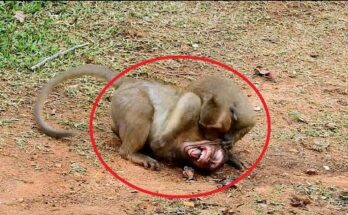Mother Mekala’s eyes were hollow with a grief that wouldn’t leave. She moved slowly through the thin light of the clearing, each step sounding like a small betrayal—as if the earth itself had swallowed something precious and refused to give it back. Her face, usually so watchful and fierce, now hung soft and tired. She kept pausing, listening for the faintest whisper of movement, the tiny protest of a breathing chest, anything that would tell her Camry was still here and that she had only been mistaken. But the only answers were the rustle of leaves and the distant call of birds that didn’t know to stop singing for sorrow.
Mekala’s search had become a ritual. She combed the stretch of ground where they had played the day before, pawing at the soil with trembling hands as though the dirt might remember and reveal what had been done. Her paws left dark imprints on the earth—prints that looked almost like words: please, please, please. She lifted each little twig, sniffed under every stone, and pressed her face to every hollow with the reverence of a mother who will not give up hope. The villagers spoke in hushed tones when they saw her, because everyone recognized the raw honesty of a love that will not let go.
When Mekala found the first patch of disturbed soil, she froze. For a heartbeat the world stilled with her: the wind stopped, the birds ceased, and even the sun seemed to hold its breath. Her nose brushed the ground, and she closed her eyes as if to will a memory into being. The smell told her what she already feared. Her body sagged, but she refused to leave. Instead she circled the spot again and again, as if by walking, by mapping, she could stitch back together what had been torn away.
Neighbors came and offered hands and words—soft apologies wrapped as explanations—but Mekala hardly acknowledged them. Their comfort was clumsy, their reasons small against the magnitude of her loss. She needed no words; she needed Camry. At night she would sit by the hollow where the earth felt the most unsteady and press her cheek against the ground as if the warmth of her face could coax an answer from below. Sometimes she let out a long, low call, a sound that folded the village into itself. It was a song of search and a question without an expected answer.
Time softened only the edges of Mekala’s sorrow, not the sorrow itself. She still rose each morning and resumed the search, tracing the same route with a patience that was almost holy. Some days a child would spot her and slip over with a small offering—a toy, a wilted flower—and place it beside her. Mekala accepted these tokens with a solemn nod, then returned them to the earth as if folding them into the memory of Camry.
There is something unbearably brave in continuing to look when the world says to stop. Mekala embodies that courage. She looks very sad—yes—but there is also a fierce dignity in her persistence. Even when hope seems buried, she refuses to accept the finality of the grave. Her search is a vow: she will keep looking, keep asking, keep listening, until the soil gives up its secret or until every last thread of her being has been braided into the effort. In Mekala’s gaze lives a mother’s promise that love, no matter how crushed or hidden, will not rest until it finds what it has been made for.


